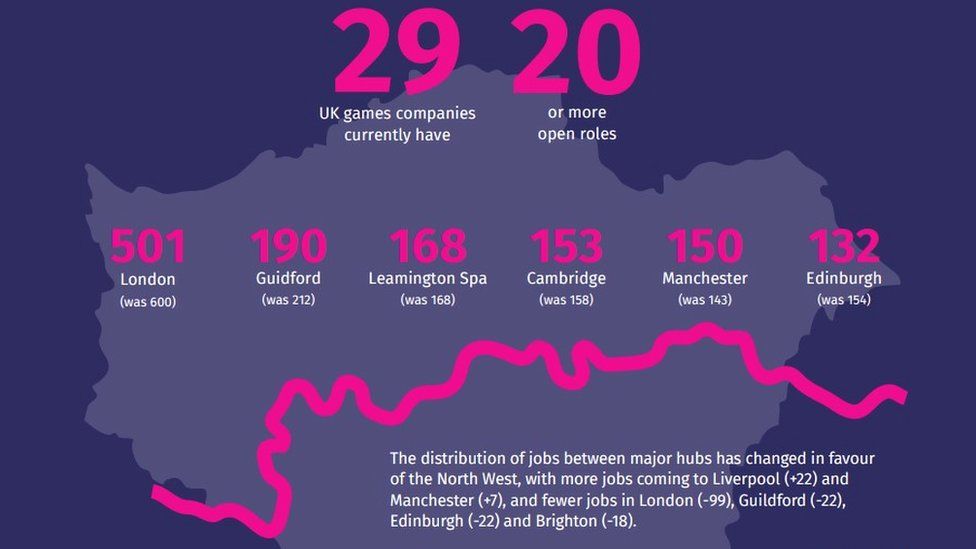 Hyper Luminal
Hyper LuminalGames studio boss Stuart Martin is taking a cautious approach to the future as the dust continues to settle on the worst of the pandemic.
Like many others in the industry, his Dundee-based indie company Hyper Luminal Games benefited from a rise in sales during the lockdowns.
But he’s temporarily putting the brakes on expansion plans in the face of the rising cost of living and soaring energy prices.
“The games industry has a history of traversing turbulent times better than other industries, but there is still a sense of caution moving into 2023,” he explains.
- Diversity in gaming: Industry promises to improve
- The birth pangs of the Grand Theft Auto franchise
“With the cost of living rising and energy prices increasing, every business will be looking closely at their cashflow and how best to support existing team members before continuing to grow.”
Hyper Luminal, which has created 40 jobs over the past two years, is now looking at “more strategic growth” and focusing on financial support schemes for its staff.
It is now aiming for “a slower rate of recruitment whilst we promote internally across 2023”.

The company, which has developed games such as Pine Hearts and Big Crown Showdown, is far from alone in rethinking its strategy.
A report by recruitment insights platform Games Jobs Live found that the number of jobs available in the UK’s games industry continues to fall sharply.
It reported 2,085 job openings this month, nearly 200 fewer than in November.

UK games industry facts and figures

- There are 2,200 games firms in the UK, supporting 73,300 jobs
- The industry adds £5.26bn in GVA (gross value added) to the UK economy each year
- Scotland’s games industry supports 5,670 jobs
- The value of the UK consumer games market reached a record £7.16bn in 2021
Source: UKIE

Since June, more than 700 open posts have been taken off the market, and currently just 183 out of 2,284 games companies in the UK are actively recruiting.
Open positions are down across most disciplines, with a significant reduction in code, design and localisation roles.
But perhaps more worryingly, there has been a 31% drop in available junior positions this month, compared with only a 2% fall in the number of advertised managerial roles.

Stuart, who describes the drop in available games jobs as “disappointing but understandable given economic uncertainty”, says Hyper Luminal is still committed to targeting entry-level roles next year.
“Our ‘grow-your-own’ approach to talent acquisition is a unique trait we are very proud of, and we strongly believe encouraging entry-level roles is critical to the future of games development in Scotland.
“We hope other studios will also keep a consistent flow of entry-level roles available to strengthen and grow our industry, even with some turbulence ahead.”
That’s a view shared by Elena Höge, founder of Edinburgh-based Yaldi Games, who wants to see more job openings directed at juniors and graduates.

“As it stands now, job openings in the games industry largely consist of mid-level to senior roles, looking for experts with several shipped games in their portfolio,” she explains.
“The games industry is complaining of fierce competition for talent and a lack of developers, with some job openings being left unfilled for long amounts of time.
“But at the same time they don’t invest in the upbringing of young talent that could grow to fit those shoes with a bit of time and nurturing.”

Elena argues that state financial incentives could be a way to encourage firms to take on younger people.
She says her business benefited from the UK government’s Kickstart scheme, which was designed to help young people facing long-term unemployment get a job.
“I used the scheme three times and I have kept all of the juniors on, even after the scheme ended,” she says.
“So for me it was a huge success, and I know of many other games studios, and especially games start-ups, that have benefited from this scheme.”
‘Element of correction’
Games Jobs Live director Colin Macdonald says the drop in open jobs should be seen in the context of the games industry doing well through the pandemic.
He explains: “This year there’s an element of a correction with less investment and fewer acquisitions, which filters down to fewer jobs.
“Concerns over the economy are driving cutbacks, both in terms of layoffs and reducing open positions, at large tech firms like Microsoft, Sony, Meta and Amazon, all of whom have games divisions.
“In turn, that creates nervousness about job security, which combined with rising mortgage rates, is causing fewer people to move around.

Colin, who is a former games commissioning editor for Channel 4, also believes that Brexit continues to have an impact on the industry.
“While Brexit had a limited impact on the distribution side, it has had a big impact on recruitment, with companies struggling to find enough talent in the UK,” he says.
“As an industry we should be doing more to develop staff internally, through training and ensuring salaries stay competitive, so that we don’t have to find so many seniors externally.
“And although the gender imbalance in the industry is slightly better than it was, we’re still not doing nearly enough to encourage more women into games, or make the industry more accessible to those that can’t afford expensive university degrees.”
‘Tough economic conditions’
Dr Jo Twist, chief executive of games industry body UKIE, says that while the consumer games market has consistently grown year-on-year, “everyone will be impacted by the tough economic conditions”.
She adds: “The industry has thousands of high-value jobs available across the country and we will continue to need highly skilled and diverse talent to continue to drive our sector successfully forward.”
Research has indicated that the future still looks bright for games firms.
Last month, market data specialist Newzoo predicted a 4.3% decline in revenues for the global games market for 2022, although it added that the long-term outlook remained positive.
-
The birth pangs of the Grand Theft Auto franchise
-
28 November

-
-
‘Long way to go’ for diversity in gaming industry
-
4 February 2020

-
